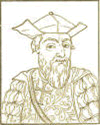| December: Today in History |
| www.studenthandouts.com > Calendars and Planners > Today in History |
|---|
| 1 |
1887 - Sir Arthur Conan Doyle's first Sherlock Holmes detective story, "A Study in Scarlet," was published. 1955 - Rosa Parks refused to give up her seat on a bus in Alabama, sparking the Montgomery bus boycott. |
| 2 |
1804 - The coronation of Napoleon Bonaparte as French emperor. 1805 - Napoleon Bonaparte led the Grande Armée to victory at the Battle of Austerlitz. 1823 - The Monroe Doctrine was proclaimed. This doctrine warned European powers (such as Spain) that they would be stopped by the United States were they to attempt to reclaim their former possessions in the Americas (such as Bolivia and Mexico). 1970 - The Environmental Protection Agency (EPA) was established. |
| 3 | 1818 - Illinois became a U.S. state. |
| 4 | 1875- William Marcy "Boss" Tweed, the force behind Tammany Hall's corruption, fled the United States after escaping from jail. |
| 5 |
1848 - President James Polk confirmed the discovery of gold in California. 1933 - Ratification of the 21st Amendment. |
| 6 |
1884- The Washington Monument was completed. 1998 - Venezuelans elected Hugo Chavez as president. |
| 7 |
 1918 -Britain's Day, honoring the friendship cemented between Great Britain and the United States during World War I, was celebrated in cities throughout the U.S.
1918 -Britain's Day, honoring the friendship cemented between Great Britain and the United States during World War I, was celebrated in cities throughout the U.S.1941 - Japanese forces attacked the American naval base at Pearl Harbor, Hawaii, drawing the United States into World War II. |
| 8 |
1886 - The American Federation of Labor (AFL) was founded. 1941 - The United States under President Franklin Delano Roosevelt declared war on Japan (World War II). 1980 - Singer-songwriter John Lennon, formerly of the Beatles, was shot and killed in New York City by Mark David Chapman. 1993 - The North American Free Trade Agreement (NAFTA) was signed into law by U.S. President William "Bill" Jefferson Clinton. |
| 9 | 1958 - The John Birch Society was formed. |
| 10 |
 1817 - Mississippi became a U.S. state.
1817 - Mississippi became a U.S. state.1948 - The Universal Declaration on Human Rights was adopted by the United Nations General Assembly. 1950 - Dr. Ralph Bunche was awarded a Nobel Peace Prize. 1964 - Dr. Martin Luther King, Jr., was awarded a Nobel Peace Prize. |
| 11 | 1816 - Indiana became a state. 1936 - TheUnited Kingdom's King Edward VIII abdicated in order to marry American divorcée Wallace Simpson. 1946 - The United Nations International Children's Emergency Fund (UNICEF) was established. |
| 12 | 1870 - Joseph Rainey became the first African American to sit in the United States House of Representatives. 1963 - Kenya became independent. |
| 13 |
1642 - Abel Tasman reached New Zealand. 1989 - The first meeting of F.W. de Klerk and Nelson Mandela occurred. 2003 - Iraqi President Saddam Hussein was captured by American forces. |
| 14 |
1819 - Alabama became a U.S. state. 1911 - Roald Amundsen reached the South Pole. 1967 - DNA was synthesized. 1981 - The formal annexation of the Golan Heights by Israel. |
| 15 |
1890- Chief Sitting Bull was killed. 1964 - The red maple leaf flag was adopted by the Canadian government. |
| 16 |
1653 - Oliver Cromwell, leader of England's Puritan Revolution, became Lord Protector of England, Scotland, and Ireland. 1773 - The Boston Tea Party was held. 1944 - Start of the Battle of the Bulge. |
| 17 |
1944 - Japanese Americans were released from internment camps. 1992 - Canada, Mexico, and the United States signed the North American Free Trade Agreement (NAFTA). |
| 18 |
1865 - The 13th Amendment, abolishing slavery, was ratified. 1956 - The United Nations admitted Japan as a member state. 1969 - The death penalty was abolished in the United Kingdom. 2010 - Start of the "Arab Spring," a series of revolutionary protests and uprisings throughout the Arab world, including the countries of Egypt, Libya, and Tunisia. |
| 19 |
1843 -
A Christmas Carol by Charles Dickens was first published. 1998 - Impeachment of President William "Bill" Jefferson Clinton. |
| 20 |
1790 - The United States' first cotton mill was built by Samuel Slater in Pawtucket, Rhode Island. This sparked the
Industrial Revolution in the United States of America. 1803 - The Louisiana Purchase was made by U.S. President Thomas Jefferson. 1989 - The United States invaded Panama. |
| 21 |
1620 - Pilgrims landed at Plymouth, Massachusetts. 1898 - Radium was discovered by Marie and Pierre Curie. |
| 22 | 1807 - The Embargo Act was passed by the United States Congress. |
| 23 | 1788 - Maryland gave 100 square miles for the creation of the District of Columbia. |
| 24 |
 Christmas Eve for Roman Catholics and Protestants
Christmas Eve for Roman Catholics and Protestants1524 - Death of Vasco da Gama in Cochin, India. 1814 - The Treaty of Ghent was signed. 1865 - Formation of the Ku Klux Klan in Pulaski, Tennessee. |
| 25 |  Christmas Day for Roman Catholics and Protestants
Christmas Day for Roman Catholics and Protestants1066 - Coronation of William the Conqueror in England. |
| 26 | Boxing Day
1865 - A patent was granted for James H. Nason's coffee percolator. |
| 27 |
1900 - Carrie Nation, famous advocate for the prohibition of alcohol, used her axe in a saloon for the first time. 1932 - Opening of New York City's Radio City Music Hall. 1945 - Creation of the World Bank. |
| 28 |
1065 - Consecration of Westminster Abbey in England. 1846 - Iowa became a U.S. state. 1869 - A patent was granted to William F. Semple for chewing gum. |
| 29 |
1170 - Murder of Thomas Becket. 1845 - Texas became a U.S. state. |
| 30 | 1853 - Gadsden Purchase completed. |
| 31 |
 New Year's Eve New Year's Eve1961 - Expiration of the Marshall Plan. |
|
December has been a month of significant historical events that have shaped the world. On December 7, 1941, the attack on Pearl Harbor by the Japanese led the United States to enter World War II, a pivotal moment in global history. December 10, 1901, marks the first Nobel Prize awards, recognizing contributions to humanity in various fields. On December 25, Christians around the world celebrate Christmas, commemorating the birth of Jesus Christ, which has profound cultural and religious significance.
Another important event is the ratification of the 13th Amendment to the U.S. Constitution on December 6, 1865, abolishing slavery in the United States. Additionally, on December 1, 1955, Rosa Parks' refusal to give up her bus seat in Montgomery, Alabama, became a catalyst for the Civil Rights Movement. The United Nations General Assembly adopted the Universal Declaration of Human Rights on December 10, 1948, establishing fundamental human rights for all people. These events highlight December as a month of impactful and transformative moments in history. |
| www.studenthandouts.com > Calendars and Planners > Today in History |
|---|






